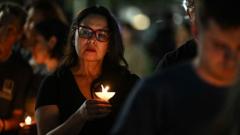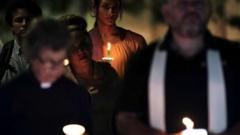Eighty years after the liberation of Bergen-Belsen, survivors, their families, and dignitaries gathered to reflect on the harrowing experiences within the camp, which witnessed immense suffering and loss as Allied forces discovered the shocking reality of Nazi atrocities.
Remembering Bergen-Belsen: 80 Years Since Liberation’s Harrowing Reality

Remembering Bergen-Belsen: 80 Years Since Liberation’s Harrowing Reality
Commemorative events at Bergen-Belsen highlight the tragic legacy of a Nazi concentration camp as survivors and families gather to honor the deceased.
Eighty years after the liberation of the Bergen-Belsen concentration camp, a solemn commemoration took place as survivors and their families gathered to remember the horrors inflicted upon tens of thousands of people, predominantly Jews. The camp, located in northern Germany, remains one of the most notorious symbols of Nazi brutality.
The liberation in April 1945 by British and Canadian troops revealed the grim reality previously hinted at by rumors and accounts from escapees. As soldiers entered the camp under a truce with local German commanders, they were confronted with a harrowing scene: around 13,000 unburied corpses scattered throughout the site, and an additional 60,000 emaciated survivors, many perishing from disease, malnutrition, and overcrowding.
The commemoration, attended by over a thousand people, resonated with poignant recollections from individuals like British soldier Michael Bentine, who later recalled Bergen-Belsen as “the ultimate blasphemy.” These reflections echo the sentiments of journalists and soldiers who captured the camp’s traumatic scenes—particularly Richard Dimbleby, the first broadcaster to report from the camp after its liberation, who described witnessing "the most horrible" day of his life.
Unlike other concentration camps that were destroyed or emptied of inmates to conceal Nazi crimes, Bergen-Belsen had maintained its gruesome reality upon liberation, with evidence of its brutality still intact. It was a final refuge for many prisoners from Eastern camps, but it quickly became a site of unimaginable suffering, reaching a toll of roughly 50,000 to 70,000 deaths between January and April 1945, including famous victims like Anne Frank.
The legacy of Bergen-Belsen remains a powerful reminder of the consequences of hatred, with eventual ceremonies including flower wreaths laid by veterans and dignitaries. In contrast to the past's echoes of horror, the grounds today are tranquil, with a visitor center and memorial markers, including one remembering the 5,000 deceased.
As narratives and memories are shared, the legacy of those who suffered continues to resonate, reminding us of the urgent need to remember and reflect on our past to guard against the repetition of such atrocities.




















